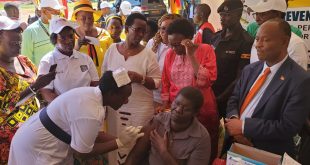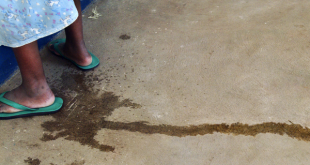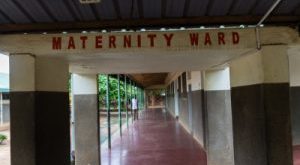
BY MARKO TAIBOT
ADJUMANI: FRIDAY, SEPTEMBER 16, 2022
Grace Drale Emilio fled her country, South Sudan, in 2016 with 15 children after the fighters killed her husband the late Shaban Obote.
She managed to stride with all the children escaping volatile South Sudan up to the border of Uganda at Elegu from where they were transported to the transit center at Nyumanzi in Dzaipi sub-county, Adjumani district.
After spending one month at the transit center, she was taken to Maaji III refugee settlement where she was allocated a 30×30 plot. She erected a shelter for sleeping using tarpaulins given by the UNHCR.
From 2016 to 2019, Drale said she was like any other refugee who has been receiving 100% humanitarian aid including food from the World Food Program, and from late 2019, the food rations started reducing.
Drale said being a single mother, it has not been easy to take care of the 15 children that she started borrowing gardens from the members of the host community and sometimes she sold some of the relief food rations to pay for hire of land for gardens but the returns were not sufficient.
Optimum land use model
In 2020 Drale got the opportunity to be trained on the optimum land use model (OLUM) by Action Against Hunger, a nongovernmental organization involved in nutrition programs targeting children and women in refugee settlements.
The OLUM training focused on how to grow organic vegetables without the use of industrial fertilizers and pesticides in a small plot of land.
Participants were guided to choose vegetables based on the soil type, resistance to pests and diseases, and the availability of the market for the vegetables. They were also taught how to make organic pesticides using local materials, weed control and other climate-smart agricultural practices.
Following the training, Drale chose to grow Tomatoes, eggplants, Onions, and green vegetables (Osubi).
She divided the plot into 2 meters by 5 meters and 1 meter by 5 meters to be able to allow her to plant different types of vegetables.
Pest and weed control
Some of the pests and diseases that disturb her are Aphids, caterpillars, cutworms, thrips, weevils, whiteflies, and mites. To combat the pests, Drale mixes soap, Neem tree leaves and some onions that she soaks for some days and gets the mixture and sprays her vegetables. She said this has effectively worked for her in the last three years she has been using the organic pesticides.
Drale said Maaji III being a fertile place supports the growth of every weed, but maintained that weed control is very key in vegetable growing. As such, she regularly uproots the weeds so that the vegetable to not have competition for nutrients from unwanted stuff.
Surviving the harsh and prolonged dry season
Drale recommends other farmers practice mulching and regular watering of their vegetables even during the dry season.
She said right from land preparation she does not burn the grass but stores and applies them as mulch and this according to her has helped retain moisture and keeps the soil wet for a long.

Drale does not apply industrial fertilizers but strictly uses compost manure from decomposing agricultural materials.
Although access to clean drinking water is still a challenge to many refugees, Drale said sometimes she sacrifices the little water to irrigate her vegetables so that they don’t dry up.
The market
Drale said there is available market to vegetables in Adjumani where both the host community and refugees depend on the local produce of vegetable.
Some of her clients are businessmen and women who buy from her for sale in the main market in Adjumani town council. Last year, Drale earned Sh2.5m per season from tomatoes, onions, eggplants, and green vegetables from her micro gardens.
She uses the money for paying school fees for her children and buy basic necessities for the family.
Challenges
Drale said the while OLUM has helped her do better agriculture, stray animals within the crowded refugee settlement is her single biggest challenge.
She estimated that she loses close to Sh200,000 every season to stray animals.
As a result, she plans to fence off her plot of land so that the animals straying around do not disturb her and destroy her vegetables.
She also has the plan of acquiring wheelbarrows for carrying water to irrigate her vegetables so that she can grow vegetables throughout the year.



